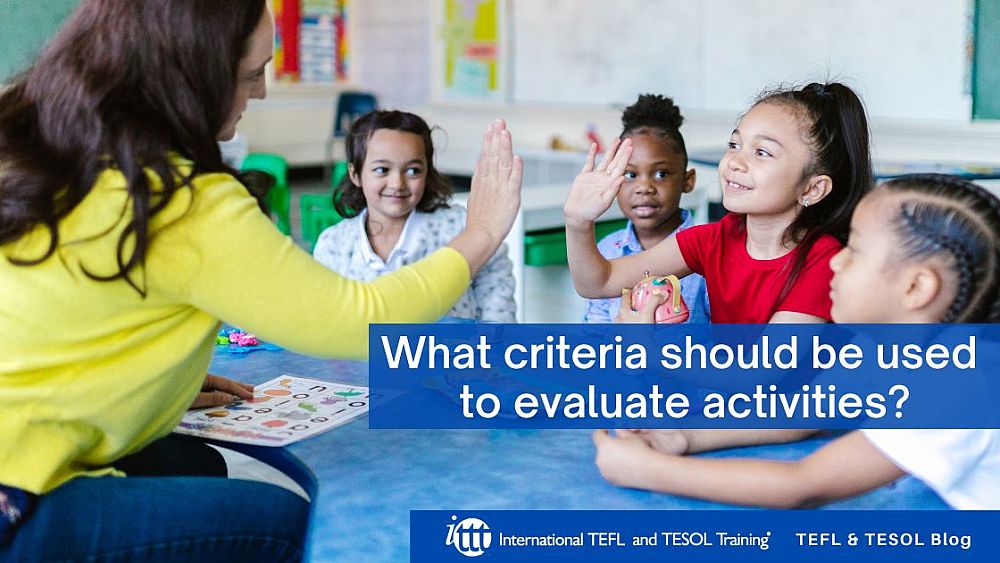What criteria should be used to evaluate activities?

Between school and spare time, the majority of kids participate in one or more extracurricular activities. Through these classes and programs, kids and teens can learn about extracurricular activities such as sports, the arts, special interest groups, and technology, to name just a few.
Table of Contents
School activities can help to:
Are you ready to teach English as a foreign language?
Check out what our course grads say in our many video testimonials!
If you and your family already have a packed schedule, you might be dubious about the benefit of extracurricular activities. The idea that extracurricular enrichment activities enhance students' social and intellectual skills is well supported by a wealth of research. Thankfully, there are more opportunities than ever for kids to find a pastime that may ignite genuine excitement.
Co-curricular activities, such as marching band, football, science club, and drama, are additions to the academic program. The relationship between extracurricular activities and regular classes is less certain. For example, chess clubs, debate groups, or even gymnastics events.
All actions ought to be organized, governed by policies, periodically assessed, and overseen by trained personnel. Additionally, the price should be reasonable and cover both participation and waiver expenses.According to Lisa Linnell (2022), due to their similar interests, extracurricular activities might aid students in making closer friendships than they could in the classroom. Additionally, practice problem-solving and collaboration. The exercises can aid in the development of emotional control in kids, which will benefit them in the classroom. Additionally, it promotes excellence in academic performance and strengthens a high school student's college application portfolio.
School activities can help to:
- Enhance participant self-esteem (Fredricks & Eccles, 2016. Cited in J. Kowalski, 2010)
- Enhance participant educational performance (Black, 2002. Cited in J. Kowalski, 2010)
- Discourage learners from dropping out of school (McNeal, 1995. Cited in J. Kowalski, 2010)
- Promote learner encouragement to do well in school (Holloway, 2002. Cited in J. Kowalski, 2010)
- Advance community satisfaction and participation in schools (Kennedy, 2008. Cited in J. Kowalski, 2010)
For the activities to be successful, they must be relevant, which implies they must appeal to students' needs and interests. Additionally, they should be planned, based on fundamental rules and principles, properly supervised by trained personnel, and routinely reviewed to see if and how they may be improved.
Every year, student activities at a school should be assessed to see if they are accomplishing their objectives and whether new, altered, or removed programs are necessary. Overall, school activities ought to be in line with or even better than students' requirements and interests.
As a result, various dimensions should be used to evaluate all educational activities. Goal, policy, guidelines, supervision, participation, financial, summative, and formative assessments are a few examples.* The task and contribution of a program to the school are determined by its statement of purpose.* Delivers program parameters is a pertinent board policy.* Influencing school policies: define participation and behavior standards* Prerequisites for supervision: Define the extent to which an activity must be supervised, the supervisor's talents, and their individuality.* Level of participation: Provides information about the number of pupils serviced* Financial requirements: list required fees and forthcoming payments (e.g., admissions charges, student fees).* Summative evaluation: evaluates whether an activity has achieved its goals and should proceed.* Formative evaluation: identifies areas for improvement in an activity.
ReferencesKowalski, T.J., 2010. The school principal: Visionary leadership and competent management. Routledge.Verywell Family. (n.d.). Find the Best Extracurricular Activity for Your Child.
Are you ready to teach English as a foreign language?
Apply now & get certified to teach english abroad!
Speak with an ITTT advisor today to put together your personal plan for teaching English abroad!
Send us an email or call us toll-free at 1-800-490-0531 to speak with an ITTT advisor today.
Related Articles:
- Top 10 Cities in Europe with the Highest Demand for English Language Teachers
- 5 Reasons To Take A TEFL Course Right Now - Even If You Are Not Leaving Yet | ITTT | TEFL Blog
- All the Documents You Will Need to Teach English Abroad
- The Impact of Positive Motivation on an ESL Classroom
- You're Never Too Old to Change Your Life and Do a TEFL Course | ITTT | TEFL Blog
- Getting Student Placement Right - The Best Desk Arrangements for EFL Students



